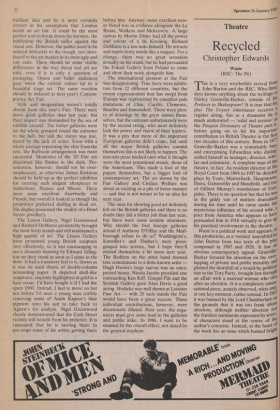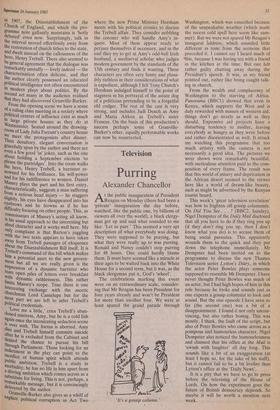Theatre
Recycled
Christopher Edwards
Waste (RSC: The Pit) "'This is a very worthwhile revival from 1 John Barton and the RSC. Who these days knows anything about the writings of Harley Granville-Barker, outside of his Prefaces to Shakespeare? It is true that his play The Voysey Inheritance receives a regular airing, but as a dramatist he is much underrated — 'solid and serious' as the Penguin Dictionary of Theatre puts before going on to list his important contribution to British Theatre in the first two decades of this century. Born in 1877 Granville-Barker was a remarkably WY and enterprising Edwardian who disting' uished himself as manager, director, scho- lar and polemicist. A complete man of the theatre, in fact. As resident director at the Royal Court from 1904 to 1907 he directed plays by Yeats, Maeterlinck, Hauptmano, Ibsen, Galsworthy and Masefield, and WI.° of Gilbert Murray's translations of Eat" pides. There is no question but that he W3s, in the giddy van of matters dramaticai during his time until he came under the mysterious influence of his second wife, a poet from America who appears to have persuaded him in 1918 virtually to give uP his practical involvement in the theatre.. Waste is a political work and appears, 111 this production, as a 'version' assembled by John Barton from two texts of the play composed in 1907 and .1926. It has an obvious contemporary appeal. Granville' Barker focused his attention on the over- lapping lapping of private and public morality and plotted the downfall of a would-be politica' star in the Tory Party, brought low through an affair with a married 'woman who dies after an abortion. It is a completely unseir sational piece, acutely observed, witty and' at one key moment, rather sensual. In 19" it was banned by the Lord Chamberlain °n . the grounds that it was too frank about abortion, although neither abortion 10 the feminist sentiments expressed by sever- al characters stand at the centre of the author's concerns. Instead, at the heart of the work lies an issue which burned bright, in 1907, the Disestablishment of the Church of England, and which the pro- gramme note gallantly maintains is 'hotly debated' even now. Surprisingly, talk in the interval moved effortlessly away from the restoration of church tithes to the state, and dwelt instead on the callousness of the hero, Henry Trebell. There also seemed to be general agreement that the dialogue was remarkably unstuffy — lively indeed — the characterisation often delicate, and that the author clearly possessed an educated political intelligence not often encountered in modern plays about politics. By the second act many in the audience realised that they had discovered Granville-Barker. From the opening scene we have a sense of a ruling class meeting in a society where Political centres of influence exist as much In large private houses as they do at Westminster. Seated around the drawing- room of Lady Julia Farrant's country house we meet the protagonists after dinner. Their desultory, elegant conversation is gracefully spun by the author and there are even a few good 'in' jokes, such as the one about holding a September election 'to please the partridges'. Into the room walks the hero, Henry Trebell, a barrister re- nowned for his brilliance, his will-power and for his indifference to women. Daniel Massey plays the part and his first entry, characteristically, suggests a man suffering from a serious head injury — he staggers slightly, his eyes have disappeared into his eyebrows and he frowns as if he has difficulty focusing on other people. This, as Connoisseurs of Massey's acting all know, Is his usual approach to the interesting but aloof character and it works well here. My only complaint is that Barton's juggling with the two texts appears to have taken away from Trebell passages of eloquence about the Disestablishment Bill itself. It is Trebell's command of this bill which makes bun a potential asset to the new govern- ment but all we are really given is the Impression of a dynamic barrister who tears open piles of letters over breakfast With dynamic ruthlessness. This rather limits Massey's scope. True there is one Interesting exchange with the ascetic churchman Lord Cantelupe but for the Most part we are left to infer Trebell's Political credentials. Love me a little,' cries Trebell's aban- doned mistress, Amy, but he is a cold fish again once the intoxicating seduction scene is over with. The foetus is aborted, Amy dies and Trebell himself commits suicide after he is excluded from the. Cabinet and denied the chance to pursue his bill through Parliament. Those looking for an indictment in the play can point to the sacrifice of human spirit which attends public ambition. Trebell is a study in morbidity; he has no life in him apart from a driving ambition which comes across as a substitute for living. This is not, perhaps, a remarkable message, but it is convincingly delivered by the author. Granville-Barker also gives us a whiff of explicit political corruption in Act Two where the new Prime Minister Horsham meets with his political cronies to discuss the Trebell affair. They consider nobbling the coroner who will handle Amy's in- quest. Most of them appear ready to perjure themselves if necessary, and in the end they try to get at Amy's odd-ball Irish husband, a mediaeval scholar who judges modern govenment by the standards of the 13th century and finds it wanting. These characters are often very funny and plaus- ibly ruthless in their considerations of what is expedient, although I felt Tony Church's Horsham indulged himself to the point of staginess in his portrayal of the astute dog of a politician pretending to be a forgetful old codger. The rest of the cast is very strong, and includes Judi Dench as Amy and Maria Aitken as Trebell's sister Frances. On the basis of this production's success perhaps some of Granville- Barker's other, equally performable works can now be resurrected.











































 Previous page
Previous page